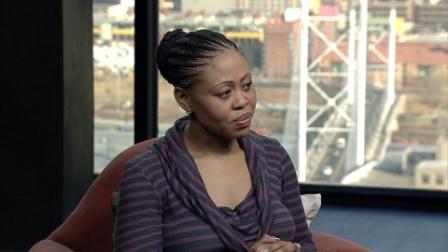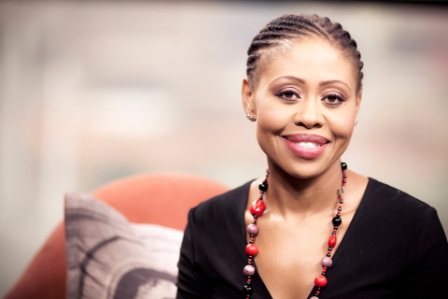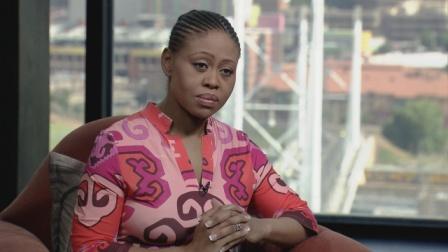South2North’s Redi Tlhabi discusses finding justice after mass atrocities
This Friday on Al Jazeera’s talk show South2North, Redi Tlhabi (in photo) discusses the idea of transitional justice and global attempts to redress the legacies of massive human rights abuses.
“Throughout history and across the world, human beings have perpetrated mass atrocities against one another,” says Redi at the start of the show, which is broadcast from Johannesburg. “Some countries have their own justice systems to deal with these atrocities. But when the rule of law breaks down or war renders laws ineffective, who steps in to right the wrongs committed by the perpetrators? And who should be held accountable and by what body of justice?”
Redi is joined by American Reed Brody, counsel for Human Rights Watch in New York, and South African Yasmin Sooka, executive director of Foundation for Human Rights, who has worked on truth commissions in both Sierra Leone and South Africa.
Yasmin says it’s still “very, very difficult” to bring perpetrators of mass atrocities to account. “We know that for every 10 of them out there, we are lucky if we are able to indict one of them in a ten year period and find that they are actually convicted.”
Reed says they used to have a saying. “’If you kill one person, you go to jail. You kill ten people, they put you in an insane asylum. You kill 10 000 people, you get invited to a peace conference…’ We need to change that.”
Reed worked on the landmark case against former Chilean dictator Augusto Pinochet, who was arrested in England in 1998 on a warrant from a Spanish judge for crimes committed in Chile.
“When the British House of Lords upheld Pinochet’s arrest, we realised we had a new tool in international justice to bring to book tyrants and torturers who had seemingly made themselves immune from justice.”
Yasmin says that there needs to be more awareness of the concept though. “If you look at South Africa, we have a High Court ruling where they talked about the fact that if the Zimbabwean torturers were to come to South Africa, then our government would have an obligation to arrest them and prosecute them. But how many South Africans know that our courts have begun to deal with these issues?”
Reed spent 14 years working alongside the victims of Hissene Habre, the former dictator of Chad, who was accused of thousands of political killings and systematic torture in the 1980s. “Just last month, 25 years after his rule, a Senegalese special court indicted him for crimes against humanity and placed him in detention,” says Reed.
He says the prosecution of Habre in Senegal is important. ”If this idea of international justice was really going to be international, it couldn’t just be the Englands and Spains of the world that took on these cases but also countries of the global south had to step up. Habre was in Senegal, so we helped the victims from Chad file the case in Senegal. 14 years later, after many twists and turns, that is where the case is going to be tried.”
Yasmin is heading to Kenya next, where President Uhuru Kenyatta is preparing for an upcoming trial at the International Criminal Court (ICC).
The ICC has been criticized for targeting African leaders more frequently than other regions, but Yasmin says Africa is partly to blame for this. “A number of the cases that went to the ICC were referred by African governments, who have really also tried to use the ICC to deal with their own political opponents,” she says.
But Reed points out that the USA, Russia and China haven’t signed the Rome Statute setting up the ICC and so “have effectively immunised themselves from international justice – or from the ICC at least.” He says this does “create a double standard and it does create a very easy answer for the cynical defenders of those who perpetrate crimes and it does threaten to undermine the architecture of international justice.“
In Kenya, Yasmin will be discussing “a transitional justice policy framework for Africa” with the African Union (AU). She expects the agenda to include the question of the AU’s relationship to the ICC.
“One of the things we want to explore is that if the African governments don’t want their perpetrators to be taken to the Hague, then what kinds of institutional frameworks are they willing to set up and how seriously are they going to take the issue of combatting impunity? So we’re going to explore whether or not the African Court can be strengthened and how we can use the question of regional courts… If you’re saying that the West has a double standard, then how are you going to ensure that you are dealing with atrocities in your backyard?”
Reed says that after two decades of experience in transitional justice, he believes it requires “a panoply of measures that should be taken together. Truth without anything else can be just words. Prosecution without these larger measures can look like revenge. Compensation without anything else can look like blood money.”
This week’s episode of South2North premieres at 19:30 GMT on Friday, 30 July 2013 and also screens on Saturday at 14h30, Sunday 04h30 and Monday 08h30.
For more information, visit http://www.aljazeera.com/programmes/south2north/, where all episodes are available to watch online.
You can also tweet your questions, comments and opinions to @AJSouth2North or find South2North on Facebook: http://www.facebook.com/pages/South-2-North/255419671252120.
Catch up on last week’s episode, where Redi discussed why capitalism needs poverty, at http://www.youtube.com/watch?v=UHQn0KOIJpg.
Kevin Kriedemann & Joy Sapieka, Publicists: Africa Al Jazeera Media NetworkStay with Sierra Express Media, for your trusted place in news!
© 2013, https:. All rights reserved.







